Opera and Classical MusicNotes
December 20, 2009
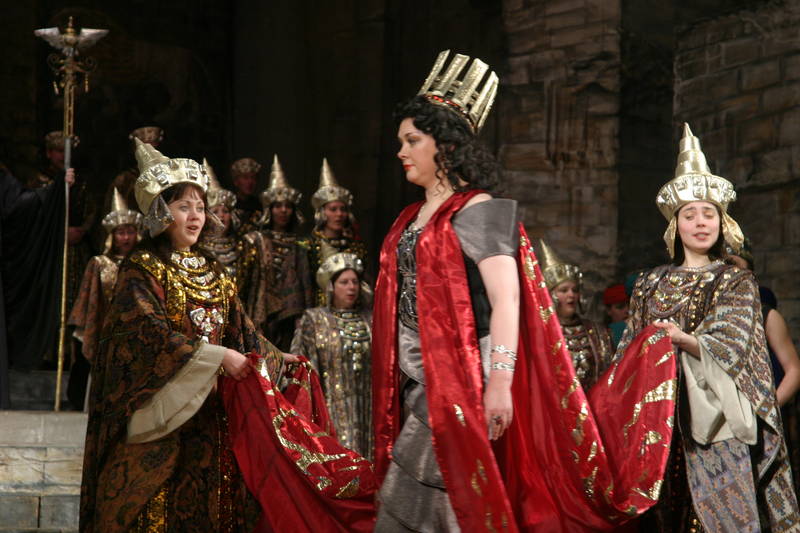
Abigaille in G. Verdi's Opera Nabucco
It is no easy task to achieve something close to perfection in all the components of an opera performance. In most cases, it is practically impossible, if the peformance is taking place in a theatre with limited resources, unable to engage top, world-class soloists for the main roles.
Admittedly, there are “cloudy” moments on even the three or four “great” opera stages. After all, the voice is a fine and temperamental instrument. But then, therein, lies the specific charm of this bright and living genre, that we call Opera. Somehow, with appropriate attempts and some lucky breaks, the “moment of truth” can happen on even one of the “lesser” opera stages of the world.
Something like this occurred at the Nabucco performance on December 20, 2009 on the stage of the Lviv Opera House. The role of Abigaille was sung by Lyudmylla Savchuk.
For a conductor, orchestra, partners on stage and, ultimately, the audience, it is particularly uplifiting and exciting, to hear a fine tuned Abigaille strutting the bright, flexible passages and jumping across the double octaves (oh! This Strepponi…), while acting and looking like a 30-35 year old – fierce and full of self-confidence – a feline “playing” with the mouse, in her final scene in Act 1 of G. Verdi’s Nabucco.
And then in her aria in Act 2, easily reaching the high C, as she ironically “dreams” in precise mezzovoce convincing all, that the performance is not simply a vocal exercise. The notes realistically convey her aggression and belligerence. She is well pleased with herself.
In a performance, there is more, so much more, than just the voice and the written notes. In the past, I have been witness to numerous Aidas and Radameses sending a prayer to the Almighty, just before going out, onto the stage in a number of different opera theatres.
It is true that the singer’s voice must fit the role. But, it doesn’t end there. The personality, psychological makeup and ultimately the intellect of the singer are also crucial. Either the singer will simply perform the notes while keeping to the traditions and standard cliches, or without airs and falseness really “hit it right on” and become the character personality and voice combined, convincing all, particularly the audience. This is true success.
“Concrete” fermatas and effective coloratures make Opera what we want Opera to be. But, we need so much more! It is this “more” that the audience searches for. And, it is this need that is so often lacking in our genre. By the way, with Puccini, it is somewhat easier. But with Verdi, this lack becomes particularly acute.
December 8, 2009
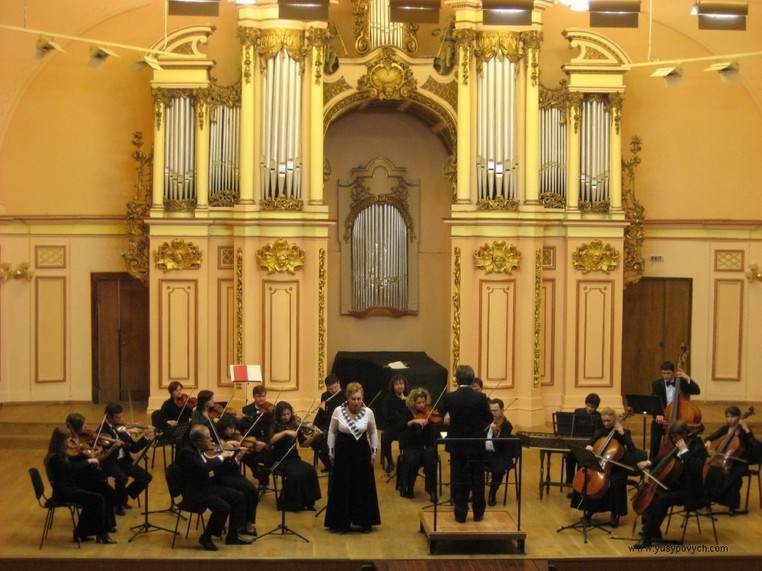
Bach Cantata №84 Performed by Soprano Natalya Dytiuk
The idea of performing J.S. Bach's Coffee Cantata (see November 27, 2009) became the impetus to perform a different Bach Cantata, namely Cantata №84. I did this on the Lviv State Philharmonic stage with the Lviv Chamber Orchestra «Lviv Virtuosos» and soprano Natalya Dytiuk.
Substituting the theatrical and secular coffee piece for the sacred №84 was somewhat risky, particularly, in light of the fact, that there is no tradition in this part of the world of listening to Bach's Cantatas. Not so long ago, during Soviet times, performing and listening to the music of Bach put to the words of the Holy Scriptures was absolutely unthinkable!
For this performance, the audience did not sit in a place of worship, with its venerable atmosphere, but in the hall of the Philharmonic. Nevertheless, the listeners were treated to interesting and pertinent information about the great Bach, a poetic translation of the Canata text and finally a very passionate, animated and exclusive performance.
I suspect that there were a number of listeners in the audience that evening, who discovered that J.S. Bach is not a brilliant but boring idol. Instead, they heard a living and spiritual genius, who offers us access to the harmony and depth of the spiritual realm through words and music.
So, the premiere was a success. Natalya Dytiuk performed the recitatives and arias venerably. Taras Nester (oboe) and the «Lviv Virtuosos» had a clear musical tone. Inna Pavliuk presented interesting commentary. My efforts in these regards bore fruit and I am well pleased.
Finally, one more comment.
It is difficult for us to imagine how extremely prolific and efficient the composer had to be. For according to Bach's contract, he was obliged to compose, rehearse and perform a new Cantata every Sunday and additional ones for key Church holy days. This meant, 59 compulsory Cantatas in one calendar year! Additionally, he was expected to compose secular music, for which he received regular orders from his demanding employer.
Absolutely incredible! But then, that's J.S. Bach.
December 6, 2009
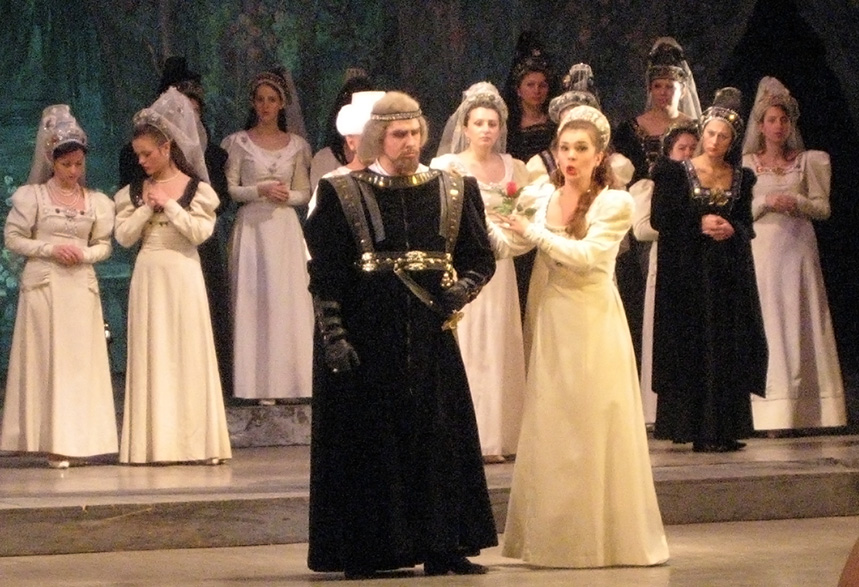
Young Opera Singers in Iolanta
An important step in the career of a young singer, an opera bass, is the first time he performs the role of King Rene in P. Tchaikovsky's Iolanta.
Iolanta is a one act opera, which takes about 1 hour and 20 minutes to perform. The role of King Rene in this opera is not as lengthy as other «classical» main opera roles for basses, such as Boris is Boris Godunov, or Dosifey in Khovanshchyna by Modest Mussorgsky; King Philip II in Don Carlos or Zaccaria in Nabucco by Giuseppe Verdi. Nevertheless, in the opera vocal hierachy, King Rene is near the very top.
To perform the role of King Rene, a singer must use the full range of the bass voice – from a low F to a high F. Additionally, he must infuse this pivotal role in the plot of the opera Iolanta with a great deal of emotional and acting finesse. As such, the role of King Rene can be undertaken only by a geniune operatic bass.
The young singer Ihor Nazarov, a soloist with the Lviv Opera House, successfully sang the role of King Rene for the first time in the opera Iolanta on December 6, 2009.
There was also another first that evening. The role of Iolanta was convincingly portrayed by the young soprano, Veronika Kolomishcheva.
November 27, 2009

Bach’s Coffee Cantata?
What kind of music should be heard at the Bryndza Festival (Feta Cheese Festival) in Rakhiv, Ukraine? Logically, the Trojista Muzyka (Folk Trio Music) with its bright and intense sounds so well loved by the Hutsuls, should be mandatory. Although, obviously, there is a place for other types of music as well.
At Oktoberfest in Bavaria, the colourful folk bands and brass orchestras, with their marches and polkas, go well with a good beer.
But, what about the Coffee Festival in the coffee capital of Ukraine? What performers should perform in Lviv and what music should they play? The obvious answer should be The Coffee Canata by J.S. Bach.
Unfortunately, for a variety of reasons, this didn't happen in 2009. But then, since this is a yearly festival, there is always next year – 2010.
October 29, 2009

Young Opera Singer – Yevhen Orlov
There were 12 young tenors, who wanted to sing the role of Count Vaudemont in P. Tchaikovsky’s Iolanta as part of the 3rd round at the Fourth Solomiya Krushelnytska International Competition of Opera Singers, on the stage of the Lviv Opera House.
To my great disappointment, not one of them was given the opportunity to do this, even though most of them have the necessary vocal abilities and performed well during the 1st and 2nd rounds of the competition.
As always, there were those who performed better and there were those who did not do so well. But, there is something strange when a tenor, who is a soloist with the National Opera in Kyiv, during the 2nd round of the competition shows a number of positive traits, in particular “reaching” the high C in the aria of Faust in G. Gounod’s Faust without difficulty, maintaining the fermata, gradually fading it and yet – he doesn’t make it into the 3rd round of the competition. Not only strange, but also sad and… embarrassing!
And so I wonder: what does it mean when I hear around me the popular and currently chic phrase “a crisis of available male voices”. To my mind, the crisis is not because there is a lack of voices, but because of something completely different. And, it isn’t due to 21st century life-styles or various environmental issues.
So, for this performance, I had to be satisfied with a wonderful young male bass singer – Yevhen Orlov in the role of Rene, the King. He is a medium range bass, with a rich timbre. And, he is only 26 years old. Someone to look out for in the future!
As for the other, I guess one can’t have everything in life.
October 16, 2009
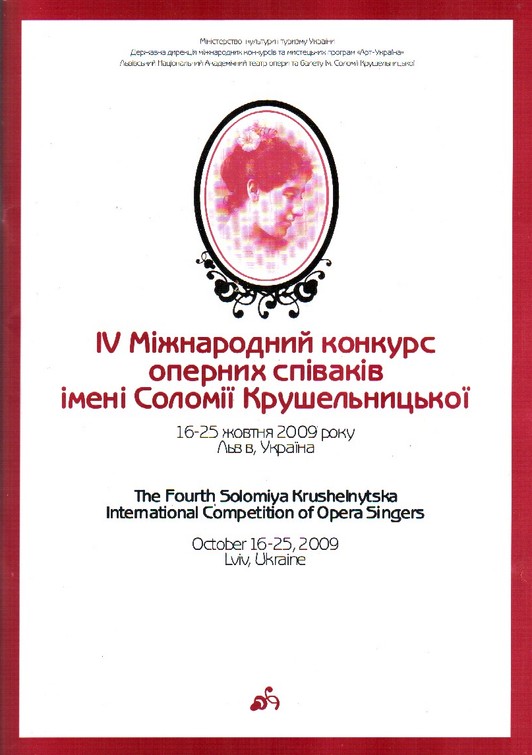
S. Krushelnytska Young Opera Singers’ Competition
What are the benefits for a young opera singer when he or she participates in an international competition for opera singers?
I sincerely feel that there are benefits for every participant. This, in spite of and even because of the various conflicts and negative tendencies that took place, for instance, at the Fourth Solomiya Krushelnytska International Competition of Opera Singers, in Lviv, Ukraine,
Competitions provide opportunities for all participants to realistically evaluate their artistic potential. Even if young male and female opera singers don’t win, they gain invaluable artistic and life experiences.
Ironically, competitions offer the opportunity for some young singers to strengthen themselves psychologically, when they meet with deception and cynicism. Unfortunately, there are also those, who do not withstand the disappointments and break down or lose heart.
For me, as a conductor and more importantly as a human being, the key issue in all of this is, whether the young singers, who lose heart and break down are those who don’t really have the necessary inherent talents or, are we witnessing the destruction of bright young individuals, who have a great gift, but also “a thin and sensitive skin” and can’t endure the uncompromising brutality and cynicism of those who “decide” their fate.
It goes without saying, that the level of any international competition is not determined by the monetary amount, that is awarded to the winners, but by the competencies, professionalism and ethical and moral norms and principles of the people who “decide” the results, in short – the judges. Unfortunately, the experience in Lviv has confirmed the inevitable truth: the more corrupt the state, the more corruption there will be at any competition, that is taking place in that state.
I am thinking of two young singers n particular – a soprano and a tenor. In the first round of the competition, the young soprano from the USA bewitched all those who heard her Manon from G.Puccini’s Manon Lescaut, but was brutally excluded from the second round. There was also the young tenor from Ukraine, who performed the Faust aria from G.Gounod’s Faust with great inspiration and sincerity and then, at the end, almost playfully “reached” the closing fermata high C with an incredible, gradual fading, but was not allowed to continue. Unfortunately, I suspect that both these young singers will conclude that it is not worthwhile to travel to this country and to participate in this competition. However, I sincerely hope that they will not completely lose their fire and interest in the art of singing and the artistic life.
So, The Fourth Solomiya Krushelnytska International Competition of Opera Singers is over. And, I am left with both a feeling of joy from hearing new and beautiful voices and a feeling of bitterness, filled with sadness and shame.
And yet, how fortunate it is, that there are those, who want to and are able to sing and that there are other competitions in the world that spot fresh talents and provide a springboard for new and genuine stars.
October 10, 2009
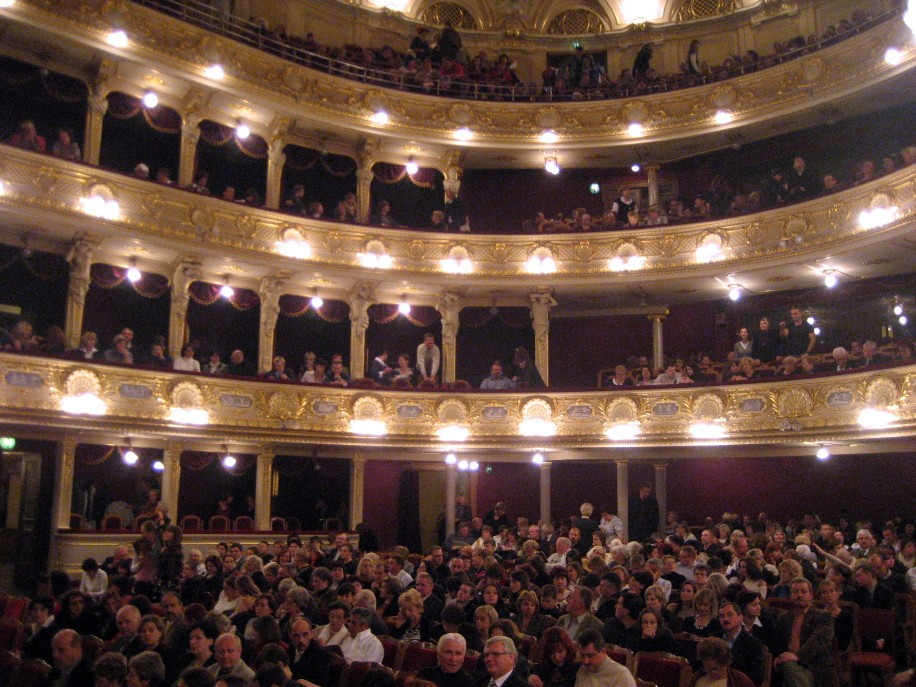
Audience at the Lviv Opera House
There was a B-flat – strong and stable at the end of Radames' romanza. And yet, no one applauded. Why not? Because there was no «heavenly Aida». There was no «mystical wreath of light and flowers». Verdi's motivation for writing the opera «Aida» was missing.
That evening, I conducted this opera for the 70th time within the walls of the Lviv Opera and Ballet Theatre! For Radames, it was his 58th time. For Amneris – only her 4th.
But, there was a full house in the audience and most of those present, were probably hearing «Aida» for the first time. Ultimately, we didn't disappoint them. When it was all over, there was a standing ovation.
But, nevertheless, for me, how much more pleasant it would have been, if the tenor's B-flat at the beginning of the opera was not just a technical feat, but a mystical wreath of inspiration. Then the «Triumphal March» in Act II would resound more brightly.
October 9, 2009

A book of poems by Myron Yusypovych
Understandably, the publication of my collection of poems was, if not a shock, then a great surprise for my colleagues and friends.
To my mind, that's okay! Sometimes, it can be delightful to surprise some of the people some of the time. After all, far better to amaze than to dissappoint.
How? Why? Since when? I was asked these and other questions during the presentation of my collection, «Why Bother Picking up a Violin?» on October 9, at the «Dzyga» Art Centre in Lviv, Ukraine.
Many things were said that evening about my poems. But, what I remember the most is: «These texts are very expressive and emotional, but, at the same time, very strictly organized.» Well, what can I say? Not bad! And, for a conductor, it can probably be said, that such a combination is almost ideal.
October 1, 2009
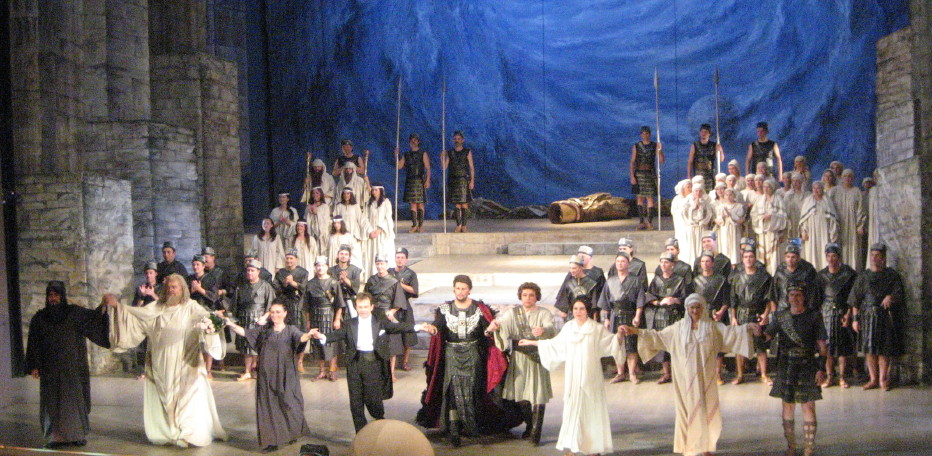
Curtain Call – International Music Day
International Music Day, which was initiated by Yehudi Menuhin and organized by the International Music Council in 1975 occurs every year on October 1. This year (2009), I had the opportunity to commemorate this day on stage, conducting G. Verdi's Nabucco at the Lviv Opera. Although that evening, it was not a full-house the atmosphere in the theatre was, nevertheless, quite uplifting and the audience responded well to our attempts.
This production, part of the repertoire at the Lviv Opera, I associate with my old conductor's tails – well cut, well put together and although no longer new, if cleaned and ironed before every performance, they «sit» and shine even better than some of these newer and fresher variants. So, there you are! It all depends on the tailor. English fabric by itself a good coat will not make. And, mind you, these tails are almost 10 years old.
So, that is why it was indeed wonderful to hear after this performance, the excited exclamations after this performance of some musical «specialist» from Vienna, as well as some experienced music lovers from London.
September 27, 2009
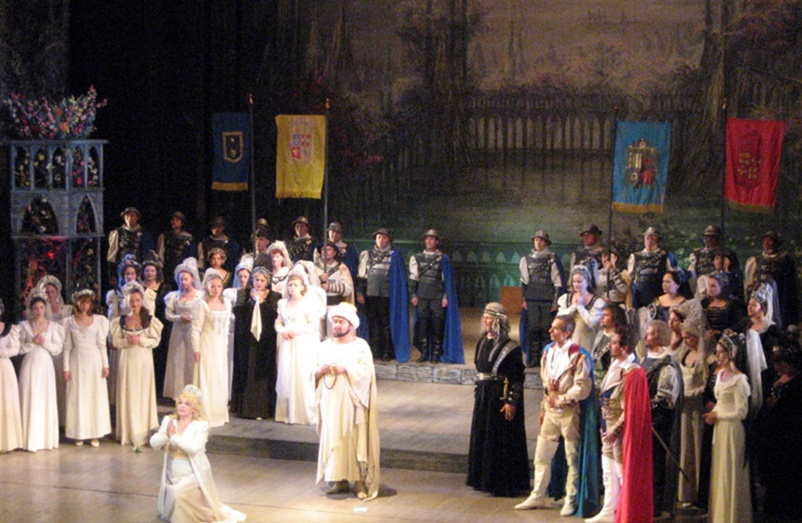
Final Scene in Tchaikovsky's Iolanta
From among all of P. Tchaikovsky's operas, the one I most enjoy conducting is – «Iolanta».
What is important for me, is, strangely enough, not just this opera's music. In this particular case, of particular interest is the fact that the literary source led the composer in a very different direction. Being Tchaikovsky, he maintained a maximum clarity, passion and even exaltation while going down the path in seeking a spiritual balance, a positive reassesment of life and a personal reconciliation. In «Iolanta» we are able to see and hear Tchaikovsky attempting to reach something he had aimed for, during a major part of his life and without which, he suffered to the final days of his life.
Two years before his death, for a short period of time the evil «phantom» released him. The dark and leaden clouds of frozen St. Petersburg, so evident in «The Queen of Spades» (1890), blew away and there came an enlightenment, which gave birth to this completely different «radiant music».
Probably, in the final years of one's life, we are more open to reconciliation, harmony and peace.
«To see» and «to hear» that, which throughout one's life was always alongside, but which we didn't see among the never ending hussle and bustle, is the essence of happiness. To see and to be satisfied by «God's endless goodness» which «has no limits» is a guarantee of joy. The role and meaning of a religious element is undeniable and requires no explanation.
But, it would appear that attaining such level of joy doesn't happen in and of itself. If we don't make an effort to understand this, then the leaden clouds, the evil clouds of the «phantom», will once again cover the sun and will supress the momentarily released, tormented soul.
And so, P. Tchaikovsky completed «Iolanta» in 1892, and in 1893 he gave us the difficult Sixth Symphony in B-Minor, the «Pathetique» and then, … the composer's death.
September 13, 2009
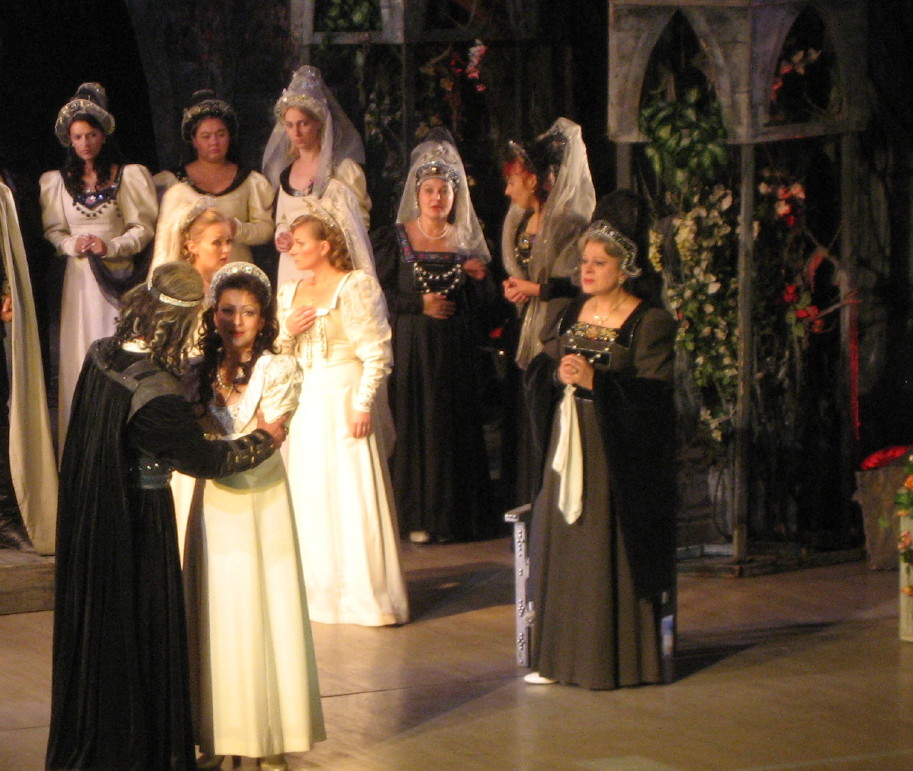
Iolanta Lviv Opera
It has been about two years, since Pyotr Ilyich Tchaikovsky's Iolanta was last performed at the Lviv Opera. While working on its renewal, I once again experienced the uniqueness of this masterpiece.
Interestingly, during the Soviet period this opera was staged very frequently. However, the libretto, or text was always altered from its original. Religious connotations and Christian moral values are fundamental, key elements in various episodes of this opera. And yet, I still remember when all such references were uncompromisingly erased and a «new» non-religious and abstract text was inserted in their place.
So, for example, in the final moments of the opera, a hymn to the Almighty «Praise be to You!» was changed to a glorification of the physical world: «we will glorify light, the source of all wealth». To emphasize the physical, during the final chords of the opera all of the house lights would be brought up.
Thankfully, all of this is in the past!
Translation note: The Russian word «свят» (sviat) means «holy», while the word «свет» (sviet) means «light».
September 9, 2009
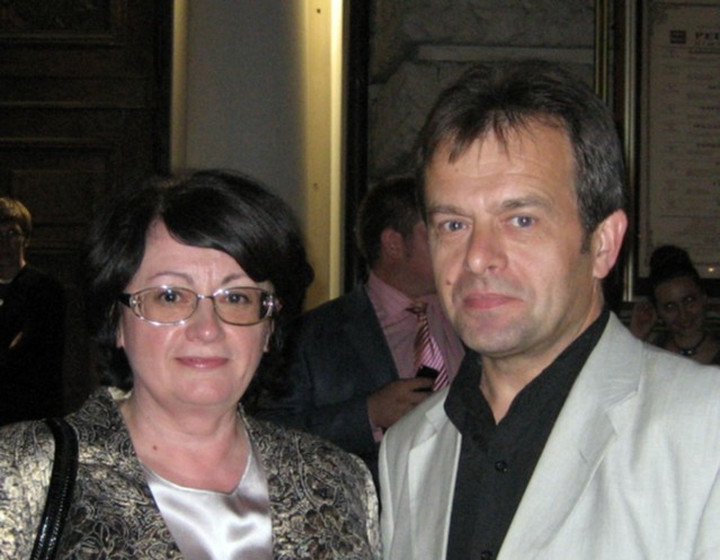
Best Books Contest 2009, Oleksandra Koval, Myron Yusypovych
I was invited to paticipate as a judge in the Best Books Contest, that was part of the 16th Annual Book Forum in Lviv.
As a judge, I noticed the elaborate and expensive publications dealing with the theme of Ukrainian art. Most of these books are published according to high quality standards for content and visual appeal and, unquestionably, are valuable and important. For me, however, they became secondary.
I was drawn more to several unassuming, contemporary books which, over the course of the past few years, have become best-sellers in the West. For the first time, these books have been published in Ukraine and in the Ukrainian language. I am referring to such well known European authors as Edward Lucas, H?l?ne Blanc and Astolphe de Custine.
Although somewhat unusual for today's Ukrainian reader, the material presented in these books is remarkably current. It gives us an opportunity to soberly examine our uneasy life today, reevaluate some aspects of it, remove some blank spots, cease looking at the world through rosy glasses and reaffirm for ourselves that nothing in life happens by chance. For everything there is a reason and for every action a reaction.
It is in this light that we need to examine the recently reprinted «The Exterminated Rennaissance» by Yuriy Lavrinenko. This anthology of Ukrainian literature was initially published in Munich, in 1959.
Reading this anthology, I better understood the root of Ukraine's current problems. In 1930, there were 259 Ukrainian writers and poets, who were publishing their works in the USSR. After 1938, only 37 of them were still alive (!!!). Those who disappeared, were either shot and executed or committed suicide or simply perished in Siberia. Writers are members of a nation's elite and the fate of Ukraine's entire elite is reflected in these statistics.
Without question, such a «yesterday» has «resounded» in our «today».
Knowing this overshadowing and unavoidable fact, it is up to us to change this «present» for a better «future».
June 18, 2009
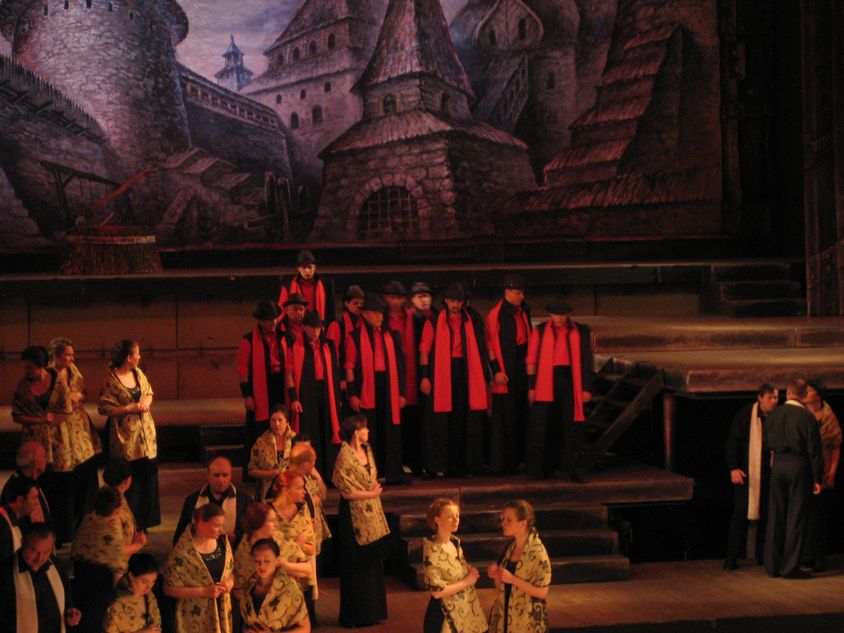
N. Rimsky-Korsakov’s “The Tsar’s Bride” at the Lviv Opera
For quite some time now, I have been obsessed with the idea of an opera production at the Lviv Opera House where «the center of gravity» is not on the brilliant outer trappings of the production (i.e. decorations and costumes, which have always been on a high level, even though a little old-fashioned), but on the clarity of the musical and dramatic performance itself.
In the current production of «The Tsar's Bride» by N. Rimsky-Korsakov, we have been able to achieve this to some degree. As conductor and to a large degree the stage director of this production, the fact that there was not enough money for a «full fledged» production that would have allowed us to recreate fully the era of Ivan the Terrible through decorations and costumes, did not sadden me too much.
Traditionally, the audience has come to expect glamourous and expensive productions at the Lviv Opera House. It was, therefore, indeed a pleasure to see this same audience react positively and with enthusiasm to an «atypical» production of «The Tsar's Bride» at its permiere on June 19, 2009.
So, the opera stage doesn't necessarily have to be a fashionable kaleidoscope of expensive costumes, magnificient paintings, decorations and staging akin to a concert-oratorio.
This time the emphasis was on a clear recreation of the drama through sound and action. And this, in turn, was acknowledged by the listeners themselves. Not surprisingly, for after all, this is the essence of opera.
June 11, 2009
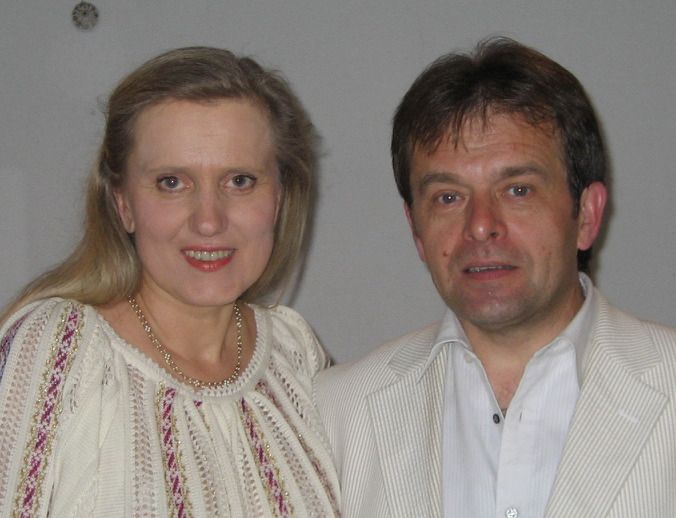
l-r: Oksana Herasymenko, Myron Yusypovych
Sometimes it is completely acceptable to exchange my black tails for a white tuxedo. To my mind, there comes a time when it is it good to put aside Wagner and Tchaikovsky and take on someone like Astor Piazzolla, who is so beloved by an honest and undemanding audience.
However, this time it wasn't Piazzolla and the tango, but Oksana Herasymenko and the bandura. There was even an oboe, a flute and the Lviv Chamber Orchestra «Lviv Virtuosos».
It isn't often that one is able to work with contemporary composers who are capable of creating real beauty using non-stereotypical melodies.
Oksana Herasymenko is truly competent.
Additionally, she opens up new horizons for the bandura. For Oksana Herasymenko, the bandura is not just an instrument that is an atribute of Ukrainian folklore, but something extraordinary, refined, unique and enchanting.
This was an evening full of inspiration and beauty.
And now, I can return to Aida.
May 21, 2009
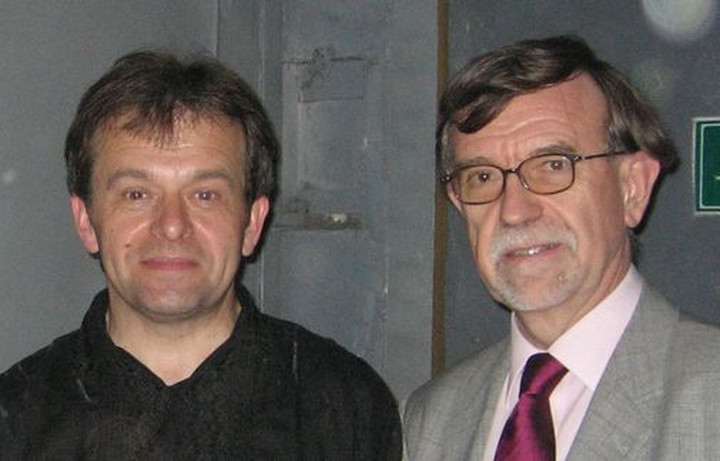
l-r Myron Yusypovych, Otto Biba
G. Verdi’s opera Nabucco was successfully performed once again on May 21, 2009 at the Lviv Opera House.
I was pleasantly surprised when that evening a specialist in music and the current Archive Director of the Association of Music Lovers of Vienna Archives (Musikverein) was in the audience. And so, the quality of the performance was acknowledged not only by that evening’s audience, but also by this important guest from Vienna, who, while being in Lviv, happened to come to this performance at the Lviv Opera House.
I don’t conduct in order to please the critics, and yet… it is indeed a pleasure, when not only sensitive and gushing ladies express their enthusiasm for my work, but a knowledgeable expert, who is aware of the minute details of my craft. That is indeed gratifying!
May 20, 2009
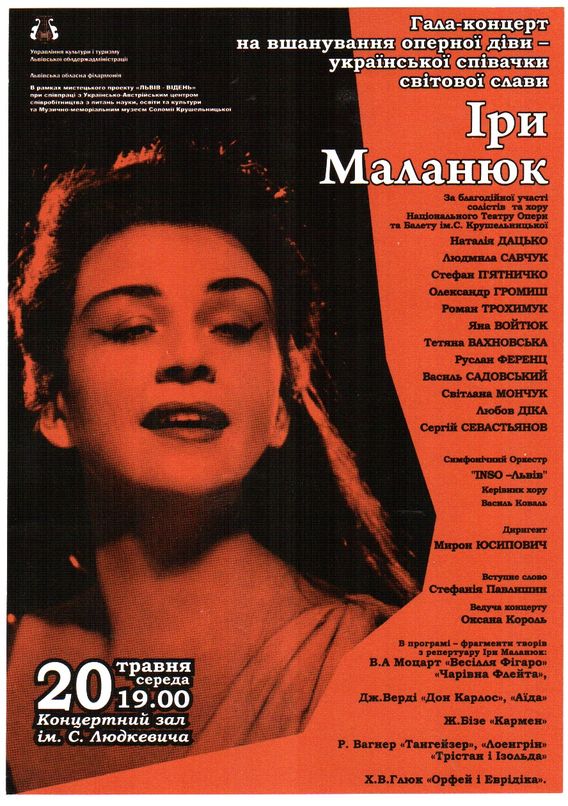
Gala concert in honour of mezzo-soprano, Ira Malaniuk
Two years ago, when I was in Vienna and walking past the Staatsoper theatre, I was pleasantly surprised to see Ira Malaniuk’s CD on display in one of the windows. At that time, she was 87 years old and as a singer, a mezzo-soprano had not sung on this famous stage for many years.
At the same time, I was distressed and saddened by the fact that in Ukraine and particularly in Lviv, very few people know anything about her. This world-renowned diva made her opera debut in 1939 as a young 20 year old in the role of Amneris in G. Verdi’s Aida on the stage of the Lviv Opera House. How many singers from Ukraine, or Russia for that matter, had the chance to perform on the stage of the Wagnerian Festival in Bayreuth, or were partnered by such greats as Giuseppe Di Stefano, Mario del Monaco, Birgit Nilsson, or appeared with conductors of the caliber of Herbert von Karajan, Karl Bohm, Dimitri Mitropoulos, Sergiu Celibidache… Personally, I’m not aware of too many…
Understandably, there was the iron curtain. Through luck and good fortune Ira Malaniuk ended up on the other side of that divide. Long ago in 1947, she slipped away from under the nose of the KGB at Semmering’s train station. Perhaps that is the reason why the cultural officials in independent Ukraine have surrounded this famous Ukrainian name in such a shroud of silence.
Whatever the opinions of others, I felt that a concert in honor of Ira Malaniuk had to happen and so it did on May 20, 2009 in the Lviv Philharmonic as part of the International Music Festival “Virtuosi”.
Judging from the reaction of the capacity crowd, the Gala Concert participants were satisfied with the impressive project – a symphony orchestra, 12 opera soloists, the Lviv Opera House Choir, a highly regarded musicologist to introduce the audience to Ira Malaniuk and last, but not least – a full house at the Lviv Philharmonic.
In planning the concert program, I tried first to choose pieces from among those that were the best in Ira Malaniuk’s repertoire. Of course, I also had to consider the capabilities of the singers, whom I had invited to take part in this project. So, there was Mozart and Wagner and von Gluck, and of course, - Verdi, Bizet and Mussorgsky… Unfortunately, despite my attempts, we were unable to perform something by Richard Strauss. Maybe next time! And rest assured, that there will be a next time.
May 9, 2009
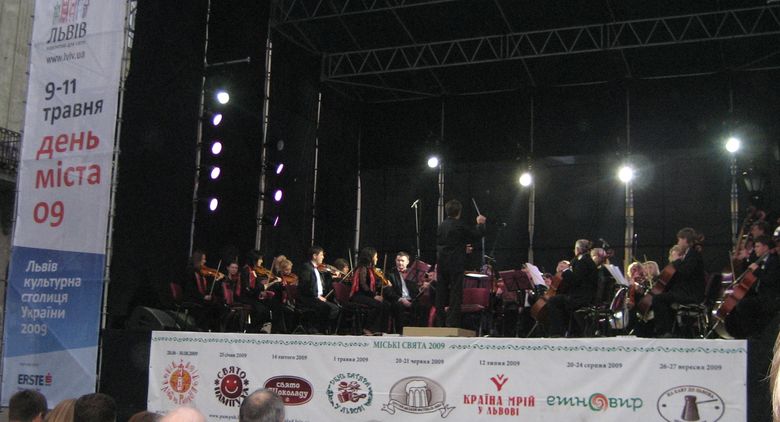
Open air concert in Lviv, Ukraine conducted by Myron Yusypovych
Over five thousand people had the opportunity, once again, to listen to a grand Gala Concert on the occasion of the yearly City of Lviv Commemorative Celebrations that took place on May 9, 2009 at Rynok Square, in the old center of Lviv.
Such open-air concerts can now be called a tradition and a wonderful addition to the many faceted features of Lviv, a truly European city.
The crowd of thousands at Rynok Square reacted with bursts of emotion and enthusiastic applause to the music of The Marriage of Figaro, Carmen, Ruslan and Ludmilla, Madama Butterfly and Cavalleria Rusticana. Such explosions of passion can usually only be seen and heard at rock-concerts. Interestingly, many of the people listening with such enthusiasm to the performance of both the symphony orchestra and the opera singers had previously, neither attended a symphony concert, nor an opera performance. For me, this fact is the most interesting and leads to certain possibilities.
In the end, there was an opportunity for this assembly of five thousand to sing a popular and well-known Ukrainian song, together with the opera soloists and accompanied by the symphony orchestra. This was my first experience conducting such a large “choir”.
Now, the issue is whether this “multitude” can be persuaded to become an “audience” within the halls of the Philharmonic or the Opera House? I am convinced that this is possible. But we need to be honest with them, by offering high quality performers and performances in order to “convert” them to this less known for them sphere of life – classical music.
May 7, 2009
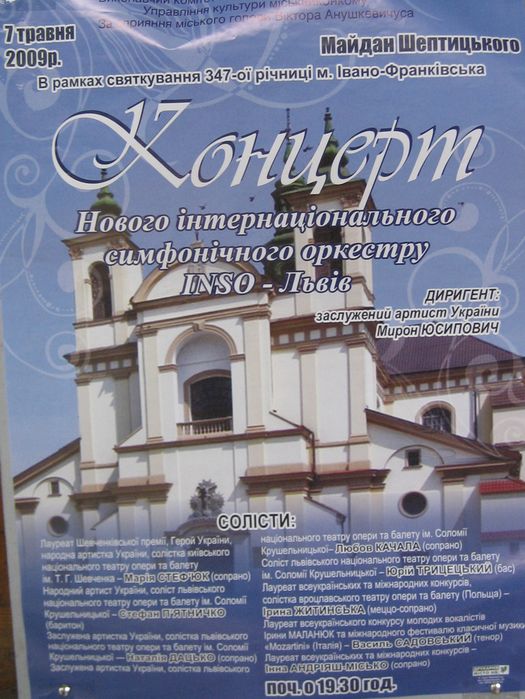
Gala Symphony Concert in Ivano-Frankivsk
Two years ago, I spent quite a bit of time and effort to revive the tradition of open-air classical music concerts in Lviv. In 2007, we started to perform such concerts with a full symphony orchestra and opera singers in Lviv’s city center on Rynok Square. Now, it appears, that this venture is gaining popularity in Ukraine
During the past two years (2007 and 2008), we had a very active open-air concert season in Lviv. There were 5 concerts performed by various symphony orchestras and different opera singers, as well as a number of similar concerts performed by chamber orchestras. Now the trend has moved to Ivano-Frankivsk.
On May 7, 2009, a grand Gala-Concert took place at Ivano-Frankivsk’s central square, Sheptytsky Place (A. Sheptytsky Majdan), on the occasion of the city’s 347th Anniversary.
The INSO (International New Symphony Orchestra) of Lviv performed. Soloists from the Lviv, Kyiv and Wroclaw opera theatres sang popular fragments from the operas of Wagner, Verdi, Mozart, Bizet, Lysenko, as well as Neopolitan and Ukrainian songs.
It was an incredibly gratifying feeling to see the faces of listeners, who in spite of the cold evening air, listened eagerly not only to the popular Ukrainian and Neopolitan songs or the well known duet by Odarka and Karas from the popular Zaporozhian Kozak Beyond the Danube by S. Hulak-Artymovsky, but also to the brilliant overtures from The Marriage of Figaro by M.A. Mozart, Ruslan and Ludmilla by M.Glinka or even Lohengrin by R. Wagner.
April 6, 2009

Vasyl Sadovskyy, Nadiya Zaborska, Lyubov Dika, Myron Yusypovych, Natalya Pavloska, Serhiy Sevastyanov, Svitlana Monchuk
Young Lviv Singers Perform in a Recital
A recital closed the Ira Malaniuk 90th Birthday Exhibit at the Solomiya Krushelnytska Musical Memorial Museum in Lviv on April 6, 2009.
Recital participants were all members of the Vocal Workshop Studio at the Ukrainian Federation of Theatrical Artists (Lviv branch) and performed under my musical direction.
Svitlana Monchuk (soprano), Lyubov Dika (mezzo-soprano), Nadiya Zaborska (soprano), Vasyl Sadovskyy (tenor) and Serhiy Sevastianov (bass) performed various fragments from operas. The recital included pieces from: «Orpheus and Euridice» by C.W. Gluck, «The Marriage of Figaro» by W.A. Mozart, «Lohengrin» and «Tannhäuser» by R. Wagner, «Tales of Hoffmann» by J. Offenbach, «Aida» by G. Verdi, «Borys Godunov» by M. Mussorgsky and «Natalka Poltavka» by M. Lysenko. At one time during her brilliant career, Ira Malaniuk performed all of these arias on some of the most prestigious stages of Europe.
Natalya Pavlovska accompanied the performers clearly and exceptionally in this interesting program. The difficult program was inspiring and performed very professionally. Most importantly, new and bright vocal talents of Lviv had a chance to shine.
April 4, 2009
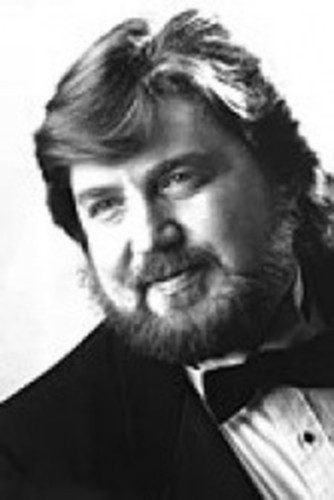
Roman Tsymbala (tenor)
On April 4, 2009, after a 10-year hiatus, the tenor Roman Tsymbala performed the part of Radames in the opera Aida.
His return to the Lviv Opera stage was successful and I am especially pleased. It is well known that it is quite a challenge to find a tenor that is consistent and performs the role of Radames on a high level. For me, this means that there is a good soloist, who, because of his mastery of this very complex role, will be able to ensure the continued and regular performance of the opera Aida. Incidentally, Aida is one of the highlights of the Lviv Opera Theatre’s repertoire.
February 21, 2009
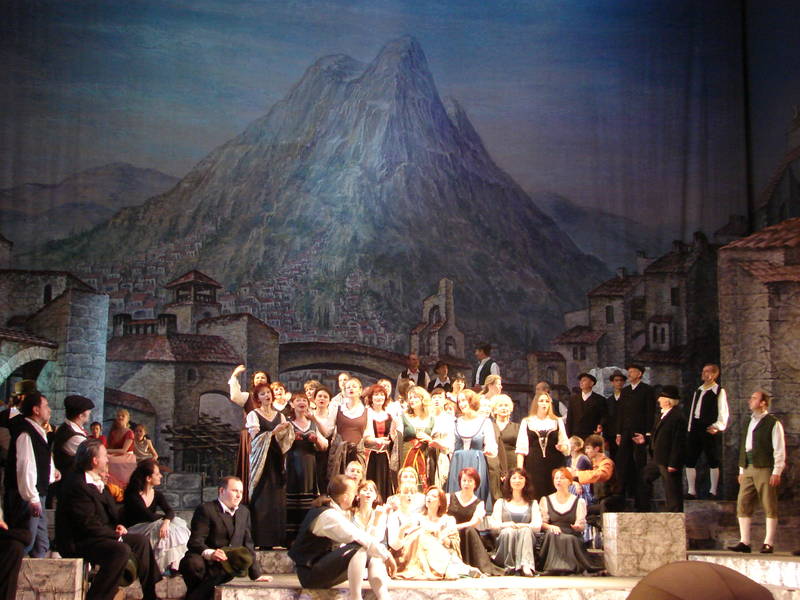
Cavalleria Rusticana at the Lviv Opera
For many opera buffs, Pietro Mascagni is not as well known as the titans of opera, such as, Wagner, Verdi, Puccini or the genius Mozart, Rossini…
And yet, the world opera treasury is richer for the presence of this exquisite pearl called Cavalleria Rusticana.
Indeed! Cavalleria Rusticana is a bright example, of the master reaching the heights of professionalism and combining them with true inspiration.
The opera contains everything that is part of its genre: a colourful, subtle and “aromatic” orchestra score; wealthy, while at the same time simple (though not simplistic and primitive), genuine melodies and harmonies, that naturally engage the listener; a concise form and a distinct dramatic line; masterfully developed choir scenes and of course, bright soloist arias, that can be called ?? of the Italian vocal school.
The story-line keeps everything very operatic (in the best meaning of the word): love, sincerity, grief, jealousy, deceit, volatileness, stubboness, vulgarity… Human beings show their sinfulness and beauty – so ridiculous and yet so eternal.
February 15, 2009
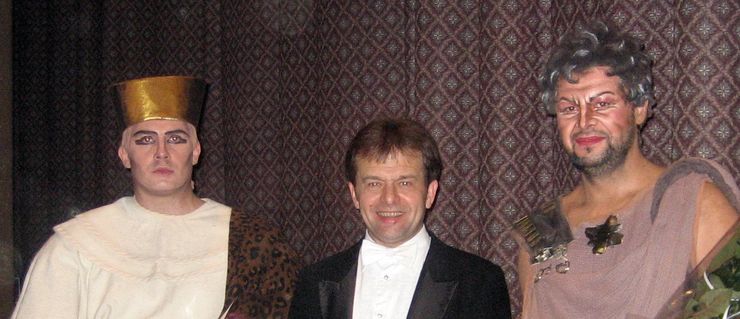
Ihor Nazarov (Ramfis), Myron Yusypovych (conductor), Andriy Benyuk (Amonasro)
On February 15, 2009 Andriy Benyuk and Ihor Nazarov, two young Ukrainian male opera singers debuted in new roles in the Verdi opera Aida, on the stage of the Lviv National Opera House.
Andriy Beyuk, a young baritone, performed the role of Amonasro, Aida’s father and King of Ethiopia. Born in 1970, Andriy has performed a number of leading roles in performances that I have conducted on the stage of the Lviv National Opera House: Robert in the opera Iolanthe by P. Tchaikovsky, Silvio in the opera Pagliacci by P. Leoncavallo and Nabucco in the opera Nabucco by G. Verdi.
Ihor Nazarov, a bass, performed the role of Ramfis, the high priest. Born in 1977, Ihor has also performed several leading roles in performances that I have conducted in Lviv, Ukraine: the High Priest in Nabucco by G. Verdi and the King of Egypt in Aida by G. Verdi.
February 1, 2009
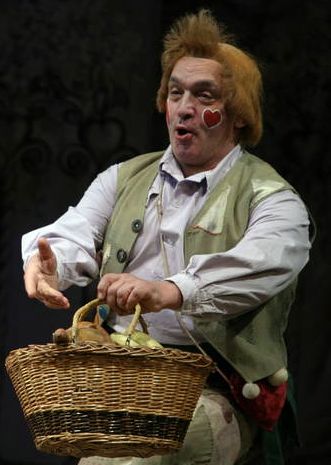
Tonio in Pagliacci
While preparing to conduct Pagliacci, after an almost two year hiatus, I once again thought about the story-line of this operatic drama. Specifically, I considered the personalities and their types… and my thoughts drifted.
In the end, was Tonio happy? Is there satisfaction after a successful revenge? What are the psychological characterics of having achieved a planned revenge? And after all, what is this phenomenon called «revenge»? Does revenge differ in a highly developed society in comparison with a more primitive society, taking into account all aspects of such societies – from quality of life to the web2 world of today?
As far as I'm concerned, Tonio should probably commit suicide and hang himself in the next few days... But, then the opera doesn't take us that far.
So be it! The bells are chimming! It's time to enter the orchestra pit!
January 29, 2009
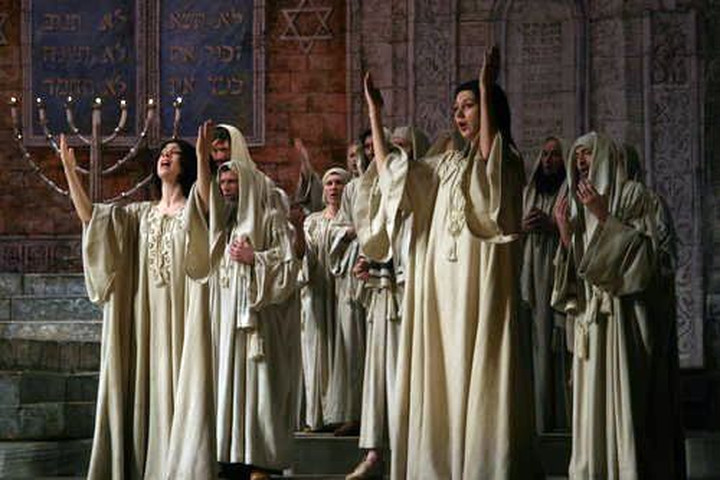
«Va pensiero» at the Lviv Opera
I am very pleased that the opera Nabucco by Giuseppe Verdi, of which I am the musical director at the Lviv National Opera Theatre will, from now on, be shown in its original full version.
«Va pensiero», the famous slave chorus from the third act of Nabucco has been returned to its 2000 version, as originally envisioned by the Italian stage director Giuseppe Visciglia.
For a long time, due to personel problems this well-known and audience anticipated opera fragment had to be shown in a simplified, almost concert like format. Now, because we have a 60 member choir and 20 extras, we are able to show a complete «Va pensiero» in the opera Nabucco in its full beauty.
 Abigaille in G. Verdi's Opera Nabucco
Abigaille in G. Verdi's Opera Nabucco Bach Sacred Cantata Performed by Soprano Natalya Dytiuk
Bach Sacred Cantata Performed by Soprano Natalya Dytiuk Young Opera Singers Perform in P. Tchaikovsky's Opera Iolanta
Young Opera Singers Perform in P. Tchaikovsky's Opera Iolanta J.S. Bach's Coffee Cantata – Maybe Next Year!
J.S. Bach's Coffee Cantata – Maybe Next Year! Tenors, Basses and Young Opera Singers at Singing Competitions
Tenors, Basses and Young Opera Singers at Singing Competitions Solomiya Krushelnytska Competition for Young Opera Singers
Solomiya Krushelnytska Competition for Young Opera Singers Sometimes a clapping audience is not enough!
Sometimes a clapping audience is not enough! «Why Bother Picking up a Violin?»
«Why Bother Picking up a Violin?» International Music Day
International Music Day «Iolanta» - P. Tchaikovsky's Final Opera
«Iolanta» - P. Tchaikovsky's Final Opera Atheist Elements Removed from Tchaikovsky's Iolanta
Atheist Elements Removed from Tchaikovsky's Iolanta Best Books Contest at the 16th Book Forum
Best Books Contest at the 16th Book Forum N. Rimsky's-Korsakov's «The Tsar's Bride» Premiere
N. Rimsky's-Korsakov's «The Tsar's Bride» Premiere Oksana Herasymenko and the Bandura
Oksana Herasymenko and the Bandura Otto Biba of the Society of Music Lovers (der Musikverein), Vienna attended Nabucco
Otto Biba of the Society of Music Lovers (der Musikverein), Vienna attended Nabucco Female Opera Singer, Ira Malaniuk, Honoured with a Gala Concert
Female Opera Singer, Ira Malaniuk, Honoured with a Gala Concert Open Air Concerts in Lviv Have Become a Popular Tradition
Open Air Concerts in Lviv Have Become a Popular Tradition Gala Open Air Symphony Concert in Ivano-Frankivsk
Gala Open Air Symphony Concert in Ivano-Frankivsk Young Lviv Singers Perform in a Recital
Young Lviv Singers Perform in a Recital Roman Tsymbala Returns as Radames
Roman Tsymbala Returns as Radames Cavalleria Rusticana performed once more at the Lviv Opera
Cavalleria Rusticana performed once more at the Lviv Opera Two young male opera singers debut in the Verdi opera Aida
Two young male opera singers debut in the Verdi opera Aida Some thoughts on Pagliacci
Some thoughts on Pagliacci «Va pensiero» returned to its original version
«Va pensiero» returned to its original version






















